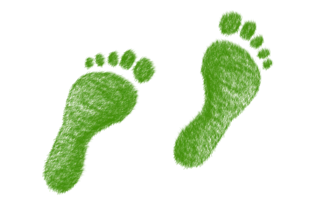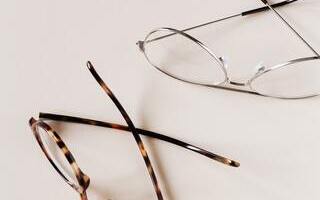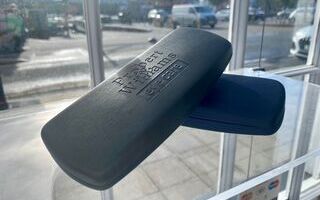At Probert & Williams Eye Care we are fully committed to minimising our environmental impact and becoming carbon negative. We know that climate change is a critical and urgent issue for humanity, and are supportive of Welsh Government, Ceredigion and Powys County Councils and the Welsh Optometric Committee’s declaration of a climate emergency. We are acutely aware of the need to be sustainable, responsible, and ethical in all aspects of our work.
What have we done so far?
We have been busy in the last few years looking at our working practices and implementing things, including:
- Becoming a pilot practice for Greener Primary Care Wales (more on that below)
- Writing an environmental and ethical working policy, and a sustainability page for our website (what you’re reading now!)
- Being interviewed by professional journal ‘Optometry Today’ discussing environmental issues in optometry, raising awareness within the profession
- Implementing a sustainable procurement guide for staff when purchasing consumables
- Sending out an ethical practice questionnaire to our current suppliers
- Setting up a recycling hub for spectacles, contact lenses and dry eye products in our practices
- Moving away from lens wipes as our default lens cleaning product to a refillable lens cleaning spray bottle, saving the planet and providing you with better value!
- Starting to ask patients if they need new spectacle cases when buying a new pair (and making a donation to an environmental charity for anyone that says no!)
- Installing a “dummy lens” recycling point in our quality control area
- Starting to maximise our small outdoor areas to become more nature friendly
- Switching to a 100% renewable electricity supplier
What are we going to do in 2025?
We aim to:
- Calculate our carbon footprint and start to implement ways of reducing this
- Investigate physical improvements that can be made to our practices to reduce our carbon footprint
- Continue improve our outdoor areas to make them more nature-friendly

Greener Primary Care Wales
We were proud to be one of the pilot practices for the new Greener Primary Care Wales Awards introduced in 2022, and were proud to have been awarded the gold award in 2023 and aim to maintain this.

Carbon footprint
We aim to calculate our carbon footprint in 2025 and will take active steps to reduce this and eventually become carbon negative.

Glasses recycling
We are happy to accept all sorts of spectacles to be sent away to our recycling partners Recycline. Unfortunately, the longstanding charity recycling programme run by Vision Aid Overseas has finished, however Recycline separate the frames into their component parts, reuse the metal and break down the plastic to be used as aggregate in other plastic products, saving them from landfill.

Contact lens recycling
If you wear monthly disposable contact lenses full time, you will be producing about 0.8kg of plastic waste per year, but if you are a daily disposable wearer it’s just over 1kg. Putting this in context, the total household waste produced by a person living in the UK is 412kg on average. For monthly disposable lenses, about 75% of the waste can be recycled at home while for daily disposable lenses, this figure drops to about 20%. Whatever lens type you wear, we want to make this figure 100% and that is why we work with a specialist recycling firm ReFactory to collect waste in-practice and turn them into new things like planters, chairs, construction boards and shopfitting materials.
Recycle at home
The following are accepted by Ceredigion and Powys roadside collections:
- Contact lens cases and the plastic bottoms of blister packs - most of these are made from PP (polypropylene)
- Solution bottles are usually made from HDPE (high-density polythene) or PET (polyethylene terephthalate)
- Cardboard packaging
Drop these off with us for recycling
- Contact lenses
(daily disposable and monthly disposable lenses) - Foil film from the top of blister packs
- Empty dry eye product packs
One thing that we certainly don’t suggest is flushing your contact lenses down the toilet! Each year in the USA alone, plastic weighing the equivalent of a fully-loaded coach (about 20 tonnes) is flushed down the loo, eventually ending up as microplastic pollution in our oceans.
For wearers of daily disposable contact lenses produced by Coopervision there is some more good news. Social enterprise ‘Plastic Bank’ are funded by Coopervision to collect, process, and reuse plastic waste that is equal to the weight of the plastic used in producing the lenses, making their lenses ‘plastic neutral.’

Frames
We stock several brands that produce frames from sustainable sources, and we consider the environmental impact of all new frame suppliers that we use.
Sea2See make frames from marine plastic waste collected by fishermen in Europe and Africa, with every frame produced being equivalent to 1kg of marine plastic waste collected from the oceans. Zeal supply us with sunglasses, and they use ‘Z-resin,’ a material derived from the castor plant to craft their frames and lenses, while Eco Conscious Eyewear, who supply some of our frames, use bio-acetate - a plastic made from cotton and a plant-based plasticiser. Both of these are a switch from the typical petroleum-based materials seen in the production of frames until now.

Spectacle lenses
We are proud to work with Zeiss who supply the majority of our lenses. They are making active steps to be more sustainable, for example they no longer use any water in the process of cutting lenses, saving enough water worldwide to service the drinking water needs of 180,000 people. They have reduced plastic waste by the equivalent of 2,500,000 plastic bags per year (they recycle all lens cuttings!) and paper waste by the equivalent of over 1,500 trees! They are aiming to be carbon neutral by 2025.

Glasses cases
Glasses cases often clutter up our homes! We give our patients the option of not having a new case, and in return we make a donation to climate change charity ‘Size of Wales.’
Reducing, reusing and recycling by our practice staff
Over the past few years we have been collecting email addresses in order to send more patients their reminder letters electronically rather than by traditional post, saving paper and the carbon emissions associated with post (29g of CO2 for a letter v 4g for an email!). We have a green procurement checklist for when we purchase office supplies. We encourage our staff to recycle, even the two non-prescription dummy lenses that are in the glasses frame before you buy them are sent to our specialist recycling partners. When we have to use single use plastic PPE, we quarantine it and sent to ReFactory, the company that also look after our contact lens waste.
Your feedback
We welcome any ideas that will help make our practices and your experience with us even better, and that includes how we can be more sustainable, so feel free to contact us at eyecare@probertandwilliams.co.uk with ways we can improve. Any ideas that we implement might even be taken forward by the national Greener Primary Care team and promoted to other primary care providers.
